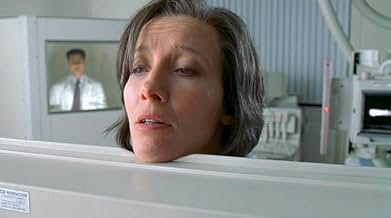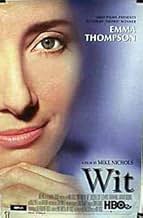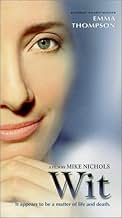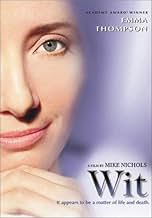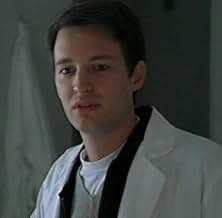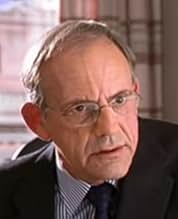Agrega una trama en tu idiomaA renowned professor is forced to reassess her life when she is diagnosed with terminal ovarian cancer.A renowned professor is forced to reassess her life when she is diagnosed with terminal ovarian cancer.A renowned professor is forced to reassess her life when she is diagnosed with terminal ovarian cancer.
- Ganó 3 premios Primetime Emmy
- 13 premios ganados y 21 nominaciones en total
- Nurse
- (as Su-Lin Looi)
- Fellow 1
- (as Harry Dillon)
- Dirección
- Guionistas
- Todo el elenco y el equipo
- Producción, taquilla y más en IMDbPro
Argumento
¿Sabías que…?
- TriviaThis movie is often shown at medical colleges as an example of how doctors and researchers should not behave.
- ErroresDuring her exam with the young internist, her arms alternate repeatedly from being completely under the sheet, to being folded together on top of the sheet.
- Citas
E.M. Ashford: Do you think that the punctuation of the last line of this sonnet is merely an insignificant detail? The sonnet begins with a valiant struggle with Death calling on all the forces of intellect and drama to vanquish the enemy. But it is ultimately about overcoming the seemingly insuperable barriers separating life death and eternal life. In the edition you choose, this profoundly simple meaning is sacrificed to hysterical punctuation.
E.M. Ashford: And Death, Capital D, shall be no more, semi-colon. Death, Capital D comma, thou shalt die, exclamation mark!
E.M. Ashford: If you go in for this sort of thing I suggest you take up Shakespeare.
E.M. Ashford: Gardner's edition of the Holy Sonnets returns to the Westmoreland manuscript of 1610, not for sentimental reasons I assure you, but because Helen Gardner is a scholar.
E.M. Ashford: It reads, "And death shall be no more" comma "death, thou shalt die." Nothing but a breath, a comma separates life from life everlasting.
E.M. Ashford: Very simple, really. With the original punctuation restored Death is no longer something to act out on a stage with exclamation marks. It is a comma. A pause.
E.M. Ashford: In this way, the uncompromising way one learns something from the poem, wouldn't you say? Life, death, soul, God, past present. Not insuperable barriers. Not semi-colons. Just a comma.
- Bandas sonorasSerenade Adagio
String Quartet #15 (2nd Movement)
Written by Dmitri Shostakovich (as Dimitri Shostakovitch)
Performed by The Manhattan String Quartet
Courtesy of Ess.a.y Recordings
Vivian Bearing is a professor of English Literature, specializing in the work of Seventeenth Century poet John Donne. Hers is a scholarly life, and she is secure with her place in it; not yet fifty, she has achieved a level of comfort with herself, as well as her work, especially in the class she teaches on Donne. With her students she is a demanding taskmaster and does not suffer fools, nor students who opt for more immediate pleasures over Donne, refusing to accept youthful zeal as an excuse for academic impropriety. In her classroom, she insists that those in attendance rise to her level; she does not stoop to conquer.
Then, with the words of Dr. Kelekian, her world abruptly changes. At first, wrapped in intellectual armor, she finds at least some comfort and respite in her beloved Donne, but she soon finds that the pursuits of the mind, even leavened with a healthy ego, attain a diminished capacity within the environs of a ravaging disease. The eternity of the hospital affords her much time for reflection, and as her illness progresses she undergoes a change in perspectives; taking stock, she considers such things as the aloof manner she affected that served no purpose other than to distance her from her students. And she thinks about it now, not with regret, but differently; her intellectual acumen no longer separates her from her students, nor affords her a lofty perch from which she may sit in judgment. She understands, at last, that she is not so different from them after all. For as she discovers to her considerable dismay-- pain is the great equalizer.
Written by Nichols and Thompson, the screenplay is based on the play by Margaret Edson. The story unfolds like a living diary, as Vivian addresses the viewer directly, with a descriptive narrative that leaves little to the imagination. Graphically real and unrelenting, it is a riveting chronicle that will hold you in thrall from beginning to end and beyond-- because this experience does not end when the screen goes dark; it's something that is going to be with you for a long time afterwards, so be prepared. And the reason this will linger in your memory is that it's a contemplation of a reality that is horrendous beyond imagination. This is that thing that always happens to someone else, but never to `me,' and to be put in the room with someone to whom the unthinkable has happened-- to be up close and personal with it-- is emotionally devastating. This is a true horror story beyond anything Stephen King could write, because this is `real.' What happens to Vivian Bearing is something that happens to people all the time, and there has never been a film before or since that will put you more in touch with what it feels like, from the incredulity born at the moment of diagnosis to the acceptance of the reality of it. And it has nothing to do with courage; it is not about that at all. It's about knowing that you are going to have to do this thing that you least in the whole world want to do-- and that you have no choice in the matter.
This film is a veritable showcase for the incredible talent of Emma Thompson, who gives a performance that is so remarkable there are not enough superlatives to do it justice. Ineligible for Oscar consideration as this film was made for television (HBO), her performance nevertheless is as Oscar worthy as they come (even more impressive than her Oscar winning performance as Margaret in `Howard's End,' which was nothing less than a study in perfection). As Vivian Bearing, Thompson is absolutely mesmerizing-- you simply cannot take your eyes off of her for even a moment. There are times when you want to look away, to avert your eyes because it's just too painful to watch, but you can't. Once you begin this journey you are bound to her for better or worse. You suffer with her through the physical pain, as well as through the base indignities to which she is subjected as a matter of course by the doctors and care givers who simply do not respond to the humanity of the person in their care; a sad commentary, to be sure, but so true.
What really marks Thompson's performance as so extraordinary, however, is the fact that as you watch the drama unfold, you forget this is an actor playing a role; rather, this is a very real person you are watching-- a person named Vivian Bearing who is dying of cancer.
The supporting cast includes Eileen Atkins (E.M. Ashford), Audra McDonald (Susie), Jonathan M. Woodward (Jason) and Harold Pinter (Vivian's Father). An emotionally absorbing drama that redefines empathy and compassion, `Wit' will make you feel alive like never before, and thankful for each and every day that you wake up healthy. It's a film that will enrich your life. 10/10.
- jhclues
- 30 jul 2002
- Enlace permanente
Selecciones populares
Detalles
- Fecha de lanzamiento
- País de origen
- Sitio oficial
- Idioma
- También se conoce como
- W;t
- Locaciones de filmación
- Productoras
- Ver más créditos de la compañía en IMDbPro
- Tiempo de ejecución1 hora 39 minutos
- Color
- Mezcla de sonido
- Relación de aspecto
- 1.85 : 1
Contribuir a esta página



